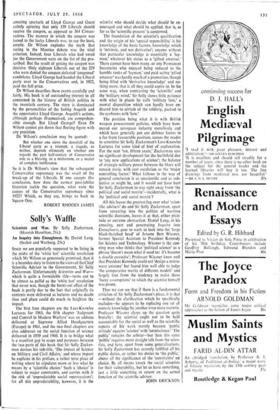Solly's Waffle
An Inquiry into Enoughness. By Daniel Lang. (Seeker and Warburg, 25s.) SINCE we are popularly supposed to be living in the midst of the 'white hot' scientific revolution which Mr Wilson so generously promised, then it is a bounden duty to listen to the views of the Chief Scientific Adviser to the Government, Sir Solly Zuckerman. Unfortunately Scientists and War— which is quite a formidable title—turns out to be almost as pallid as the 'white hot' revolution that never was, though the burnt-out effect of the book is partly due to the fact that originally its contents were delivered as lectures and no doubt time and place could do much to heighten the impact.
The first four chapters are the Lees-Knowles Lectures for 1965, the fifth chapter 'Judgment and Control in Modern Warfare' was an address delivered at Supreme Allied Headquarters (Europe) in 1961, and the two final chapters are also addresses on the social function of science delivered in 1959 and 1960. It is to bridge what is a manifest gap in scope and purposes between the two parts of this book that Sir Solly Zucker- man devises his sub-title, `The impact of Science on Military and Civil Affairs,' and whose import he explains in his preface, a rather terse piece of writing where he stipulates more or less what he means by a 'scientific choice.' Such a 'choice' is subject to major constraints, and carries with it the risk of 'unpredictable social repercussions'; for all this unpredictability, however, it is the scientist who should decide what should be en- couraged and what should be applied, that is, as far as the 'scientific process' is concerned.
The foundation of the scientist's qualification and the origin of his 'special reponsibility' is his knowledge of the basic factors, knowledge which is 'intrinsic, and not derivative'; anyone without that particular knowledge is essentially a 'lay- man,' whatever his status as a 'gifted amateur.' There cannot have been many, or any Permanent Secretaries who enjoyed being reduced to the humble ranks of layman,' and paid acting 'gifted amateur' was hardly much of a promotion, though being filled with 'derivative knowledge' and no- thing more, that is all they could aspire to. In the same way, when contrasting the 'scientific' and the 'military mind,' Sir Solly shows little patience with what in places he calls 'military lore,' a mental disposition which can hardly have en- deared him to certain of the soldiery, packed to the eyebrows with 'lore.'
The position being what it is with British weapon procurement policies, which have ham- mered our aerospace industry mercilessly and which have generally put our defence forces in a far from favourable position, causes the reader to scrutinise Sir Solly Zuckerman's Lees-Knowles Lectures for some kind of hint of explanation. For the next 'ten, fifteen years,' Zuckerman sees no significant development for the battlefield due to 'any new applications of science'; the balance of strategic military power between the blocs will remain static, with cost escalation as the 'major controlling factor.' What follows in the way of general conclusion is as unscientific and as sub- jective as might be, and it would not have hurt Sir Solly Zuckerman to stay right away from 'the political and social matrix'—incidentally, what is the 'political and social matrix'?
All this leaves the greatest fog over what 'scien- tific advisers' do and Sir Solly Zuckerman, apart from retreating into the politics of wartime scientific decisions, leaves it at that, either plati- tude or extreme abstraction. Daniel Lang, in his amusing, pert and penetrating inquiry into Enoughness, goes to work to look into the 'large black-thatched head' of Jerome Bert Wiesner, former Special Assistant to President Kennedy for Science and Technology. Wiesner is the cun- ning man who thinks that 'political science' as a phrase 'doesn't mean what it used to: it's become a double entendre'; Professor Wiesner knew well that President Kennedy could not 'design a micro- wave antenna' but found him well able to judge `the comparative merits of different models' and largely free from the tendency to make those `fuzzy assumptions' to which the scientist himself was prone.
Thus we can see that if there is a fundamental criticism of Sir Solly Zuckerman's piece, it is that —without the clarification which he specifically excludes—he appears to be replacing one set of esoteric knowledge by another even more esoteric. Professor Wiesner chops up the question quite brutally : the scientist ought not to be held accountable for the social as well as the scientific aspects of his work merely because 'public attitude' equates 'science' with 'omniscience. "The public' remains the arbiter—but then this same 'public' requires more straight talk from the scien- tists, and here, apart from some generalisations, Sir Solly Zuckerman has scarcely fulfilled all his public duties, or rather his duties to 'the public,' above all the significance of the 'constraints' on choice. By all means knock the social scientists for their vulnerability, but let us have something, just a little something in return on the actual function of the scientific adviser.
JOHN ER ICK SON






























 Previous page
Previous page